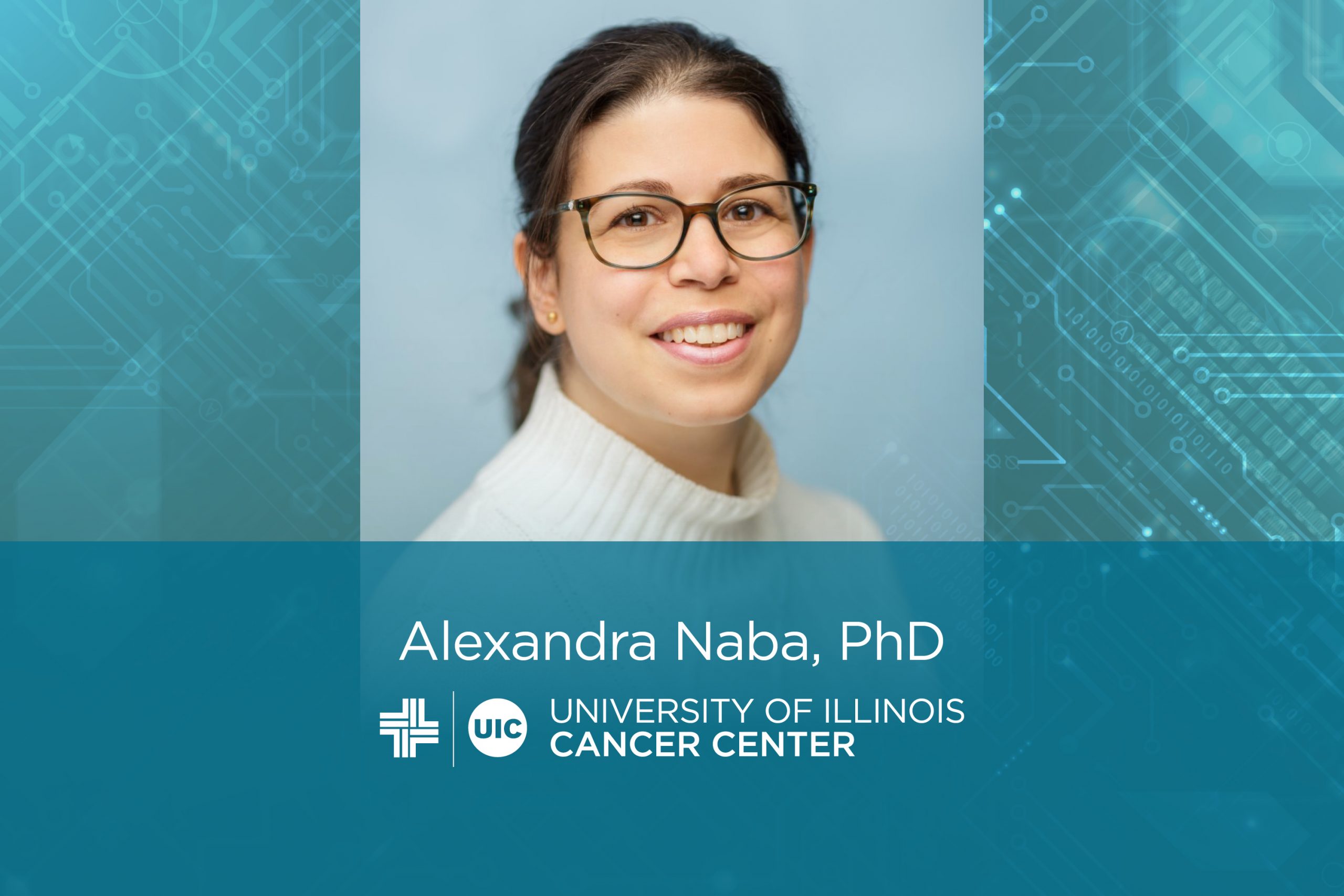
The extracellular matrix, a complex meshwork of proteins that serves as an anchor for cells and regulates numerous cellular functions, is a key element of the tumor microenvironment and a critical regulator of cancer progression. The ECM, however, is often overlooked by cancer researchers. But not by Alexandra Naba and her laboratory at the University of Illinois Chicago.
“Our goal is to better understand how the ECM contributes to diseases such as cancer so that we can exploit it to develop novel diagnostic and therapeutic strategies,” said Naba, PhD, assistant professor of physiology and biophysics at the University of Illinois College of Medicine and a member of the University of Illinois Cancer Center’s Cancer Biology program.
Mutations, which primarily cause the tumor’s growth, alter regulatory pathways that lead to uncontrolled cell proliferation. Extensive research has been performed to learn how mutations affect proteins that function inside cells, but much less is known about the ECM and the matrisome, the group of all genes encoding ECM proteins whose actions occur outside the cells.
In a first study of its kind published last year in Cancers, Naba and her collaborators analyzed data from 14 different cancer types and more than 6,000 patients and discovered that ECM genes are more frequently mutated in cancers than other genes in the genome (https://www.mdpi.com/2072-6694/12/8/2046). The research team further identified “matrisome genes whose mutational burden correlates with overall survival, demonstrating the potential prognostic value of analyzing genomic features of the matrisome to predict cancer patient outcome,” Naba said.
Intrigued by its finding, Naba’s team expanded their study to analyze data from 9,075 patients and 32 cancer types (breast, lung, prostate, colorectal, among others) from The Cancer Genome Atlas (TCGA) Pan-Cancer cohort, and found more than 100,000 non-silent mutations in the coding regions of the matrisome. The Cancer Genome Atlas is a collaboration between the National Cancer Institute and the National Human Genome Research Institute that has molecularly characterized more than 20,000 primary cancers and matched normal samples spanning 33 cancer types.
“We felt it wasn’t enough to determine whether ECM genes were mutated in cancers; we wanted to know where these mutations occurred and what could be their impacts on cancer progression and patient survival,” Naba said.
Post-translational modifications (PTMs) are critical for the performance of all proteins, both intracellular and in the matrisome. In their latest study published in the journal Cancers (https://www.mdpi.com/2072-6694/13/5/1081/htm), Naba and her collaborators discovered that, while overall the matrisome accumulated more mutations than the rest of the genome, the matrisome “seems less prone than the rest of the genome to accumulate mutations at the sites of PTMs.” In other words, mutations affecting sites of post-translational modifications are less frequent, and so, possibly, selected against.
“While they are rare among all matrisome mutations, PTM mutations show distinctive features and damaging potential which could lead to dysregulated structural, functional, and signaling networks in the tumor microenvironment,” Naba said. “It is no surprise, then, that alterations in PTMs or enzymes mediating these modifications are linked to various diseases, ranging from neurodegenerative and skeletal diseases to cancer.
“We believe our results demonstrate, at the genomic level, the potential impact of PTM mutations on the tumor matrisome. This marks a starting point to their functional characterization, enabling a more comprehensive and integrated view of this critical piece of the ‘tumor microenvironment’ puzzle whose understanding may lead to significant translational applications to improve cancer patient treatment and eventually lead to more favorable outcomes.”
Co-authors on the two studies are Martin Davis (Naba lab, UIC), and Elisa Holstein, Annalena Dittman, Ani Kaariainen, Vilma Pesola, Jarkko Koivunen, Taina Pihlajaniemi and Valerio Izzi, all of the University of Oulu, Finland.
